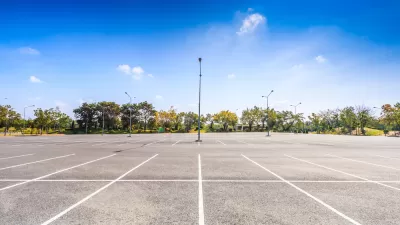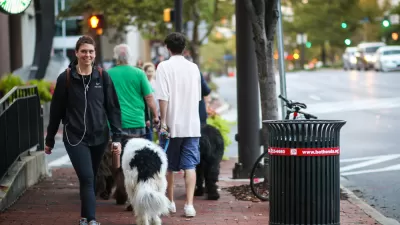An architect takes a seat on the Wet Hollywood City Council, and offers his thoughts on density and parking in the city and where things went wrong.
In this Q&A with Architect, new West Hollywood City Councilmember John D'Amico talks about the development pattern in his city and how his experience in architecture and planning will play into his new role.
"Architect: From an urban-planning perspective, what sort of strategy do you see for your city going forward?
John D'Amico: I think it has to really focus on two different but complementary ideas of urbanism. The first is that everyone in Los Angeles has to own a car, and we've got to just admit it. We may not want to owan a car, but we go to work every day, and we have to be in different places, so we own cars. People who want to come to our city, they want to come in their cars, have a place to park, enjoy their night of being entertained in West Hollywood, and then drive home.
The city has been trying to pretend, it seems, that cars and traffic are not our problems. But I think not only are they West Hollywood's problem, in some ways we are creating the problem, because we don't provide the kind of services for people in automobiles that we should. The second part of it is, we need for those of us who live here, once we get home, to be convinced to stay out of our cars. And to provide neighborhood-serving businesses that keep people out of their cars.
Architect: It's interesting how parking can play a sort of invisible role in determining how a place is used. It seems almost paradoxical, but walkability does, in some sense, rely on parking.
D'Amico:It's the kind of thing that's obvious, and we in West Hollywood haven't yet figured it out, even though we collect $10 million in parking fees and tickets every year. I think it's been the undone thing and I hope to help get some of that done."
FULL STORY: John D’Amico

Alabama: Trump Terminates Settlements for Black Communities Harmed By Raw Sewage
Trump deemed the landmark civil rights agreement “illegal DEI and environmental justice policy.”

Study: Maui’s Plan to Convert Vacation Rentals to Long-Term Housing Could Cause Nearly $1 Billion Economic Loss
The plan would reduce visitor accommodation by 25% resulting in 1,900 jobs lost.

Planetizen Federal Action Tracker
A weekly monitor of how Trump’s orders and actions are impacting planners and planning in America.

Wind Energy on the Rise Despite Federal Policy Reversal
The Trump administration is revoking federal support for renewable energy, but demand for new projects continues unabated.

Passengers Flock to Caltrain After Electrification
The new electric trains are running faster and more reliably, leading to strong ridership growth on the Bay Area rail system.

Texas Churches Rally Behind ‘Yes in God’s Back Yard’ Legislation
Religious leaders want the state to reduce zoning regulations to streamline leasing church-owned land to housing developers.
Urban Design for Planners 1: Software Tools
This six-course series explores essential urban design concepts using open source software and equips planners with the tools they need to participate fully in the urban design process.
Planning for Universal Design
Learn the tools for implementing Universal Design in planning regulations.
Caltrans
Smith Gee Studio
Institute for Housing and Urban Development Studies (IHS)
City of Grandview
Harvard GSD Executive Education
Toledo-Lucas County Plan Commissions
Salt Lake City
NYU Wagner Graduate School of Public Service





























